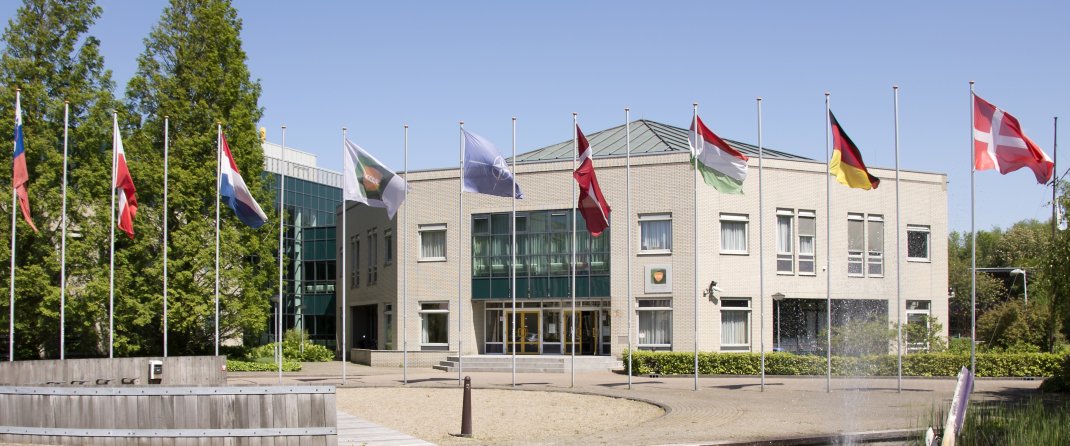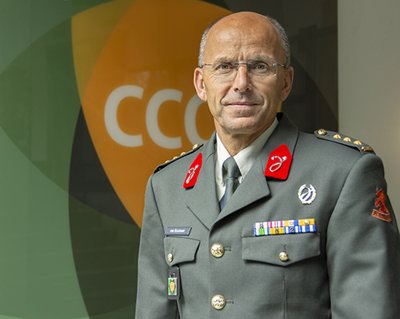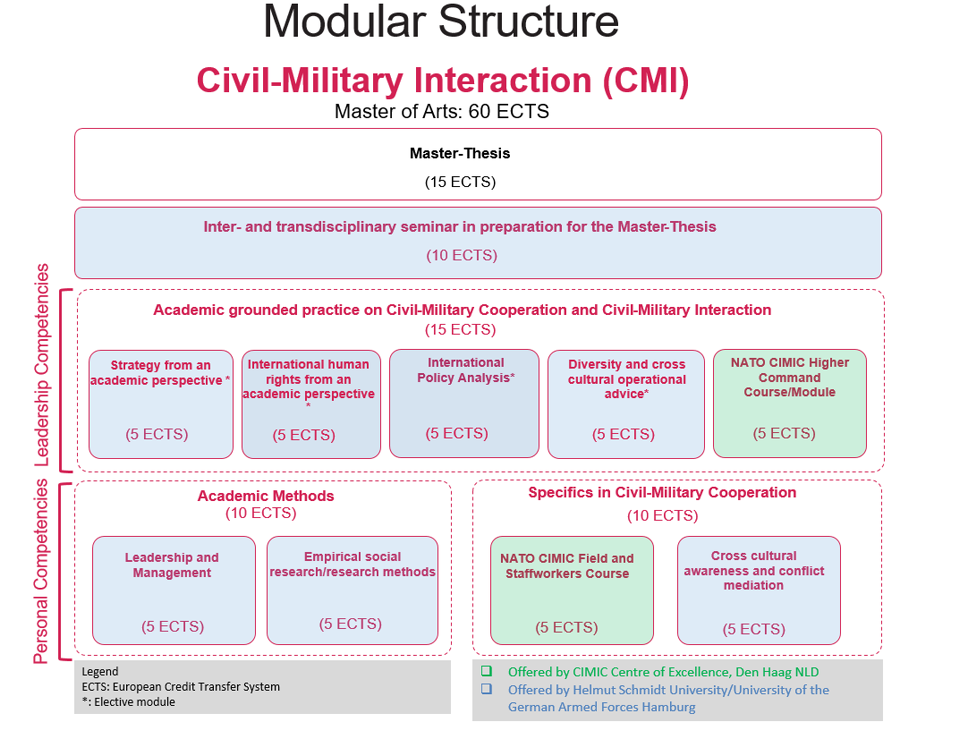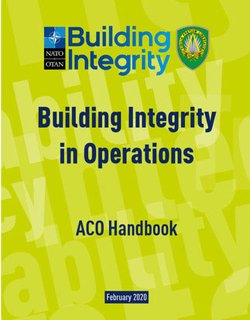CIMIC Messenger 2020-07
Dear CIMIC/CMI Community,
It is with pleasure that I introduce to you this year’s first edition of the CIMIC Messenger.
I want to start with conveying that I hope that you are all staying safe in these trying times.
Trying times; the first edition in July is a consequence of the current situation. Like most, the CCOE staff was caught by surprise beginning of March, but adapted to the situation swiftly! While working dispersed as of that moment and postponement of especially the CCOE’s training and education activities, the CCOE promptly reformed to the situation of “virtual reality”. We prioritized essential tasks of our 2020 Program of Work to guarantee our required deliverables and prepared, planned and executed important out-of-cycle, COVID-19 related requests.
An example that speaks for itself, is a currently ongoing virtual mission preparation CIMIC Liaison Course for personnel of the Hungarian Defence Forces CIMIC and PSYOPS Centre (HDF CMCPOC). I am proud that the CCOE, on request, promptly developed a tailored to the mission specifics course, as an essential part of the fast-approaching KFOR deployment (Liaison and Monitoring Team). I witnessed myself that an online execution of a CIMIC Liaison Course is, of course, a challenge, because in liaison and monitoring tasks and CIMIC in general, it is all about the interaction between people. However, the first experiences with the online interactive lectures/workshops are promising.
Institutionalized interaction in general, is a key element of two CIMIC Core Functions that revealed to be crucial in fighting this pandemic; Civil-Military liaison and support to non-military actors and the civil environment. It is clear that the Armed Forces and aligned International Organisation like NATO, EU and UN itself played and still play a significant role in a whole of government and society, Comprehensive Approach to fight this COVID-19 pandemic. Furthermore, the current crisis provides an opportunity to keep the momentum of establishing enhanced permanent Civil-Military liaison, support to non-military actors / civil environment, resulting in a boosted exchange of information at all levels. The idea is that this will also contribute to a CIMIC wished for “increased level of understanding of the Civil Environment”. For the CCOE and its community of interest, the task to make sure that we are in a position that guarantees that we are involved in the Lessons Identified / Lessons Learned process and that, in the end, enhanced CMI/CIMIC contributes to the right answer in case of similar global emergencies.
Topics of this edition of the CIMIC Messenger:
· Virtual CIMIC & CMI Annual Discipline Conference 2020,
· NATO CIMIC Awareness Course,
· Cultural Property Protection Makes Sense,
· Master of Arts - Civil-Military Interaction,
· NATO CIMIC - US Civil Affairs Synchronization,
· Lessons Learned and Analyses - Take part in our survey! and
· New publication: NATO Building Integrity Handbook.
Finally, I take this opportunity to wish everybody a nice and especially a safe vacation.
Enjoy reading, make use of the information provided and pass it on. Furthermore, I hope that in the nearby future the situation allows it that I am again able to welcome the CIMIC community in The Hague, the International City of Peace and Justice!
Best Regards,
Colonel Frank van Boxmeer MSc
DIRECTOR CCOE
Virtual CIMIC & CMI Annual Discipline Conference 2020

From the 23rd to the 25th of June, this year’s CIMIC & CMI Annual Discipline Conference (ADC) took place, both physically at the CCOE as well as virtually around the world. In close cooperation with Allied Command Transformation (ACT) and Supreme Headquarters Allied Powers Europe (SHAPE), the CIMIC Centre of Excellence planned and executed the conference in The Hague while 100 participants from 23 nations virtually joined the discussions about recent developments in the CIMIC & CMI discipline.
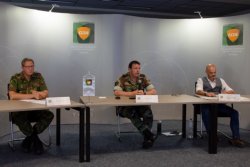 The ADC reviews CIMIC & CMI training requirements and verifies the adequacy of the current training landscape, aiming to align training needs and opportunities, to identify training gaps and redundancies and to further develop the CIMIC & CMI discipline.
The ADC reviews CIMIC & CMI training requirements and verifies the adequacy of the current training landscape, aiming to align training needs and opportunities, to identify training gaps and redundancies and to further develop the CIMIC & CMI discipline.
After the opening by Director of the CCOE COL Frank van Boxmeer, the Department Head of the CIMIC & CMI Discipline BG Lebrun provided a key-note speech. He highlighted the importance of civil-military cooperation and its contribution to national resilience and disaster response these days.
“At this time, civil military cooperation contributes at every level in all NATO member countries and even abroad (…) it is clear that we – as CIMIC – are a part of the solution to overcome situations like this”.
He expressed his personal wish to pay more attention to the Training and Education landscape of the Discipline by calling upon a refined Training Requirements Analysis (TRA) end of 2020¹.
The conference continued with presentations by SHAPE, ACT and the CCOE in its role as the Department Head for the CIMIC & CMI discipline. The focus of the first day has been on the CIMIC & CMI Training and Education landscape impact of the COVID-19 crisis on the discipline and the.
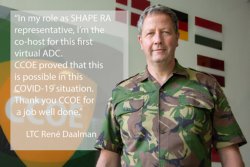 LTC Rene Daalman, executive representative of the CIMIC & CMI Requirement Authority, elaborated on the significant impact COVID-19 has had on NATO CIMIC & CMI Education and Training landscape. Extensive cancellation of courses and exercises has led to a severe shortfall in training. New innovative training solutions are needed to ensure continuity of training and education despite current travel restrictions and safety regulations. Advanced Distributed Learning solutions have become more important than ever. The CCOE will take on this new challenge and develop online-based training solutions to meet today’s demands.
LTC Rene Daalman, executive representative of the CIMIC & CMI Requirement Authority, elaborated on the significant impact COVID-19 has had on NATO CIMIC & CMI Education and Training landscape. Extensive cancellation of courses and exercises has led to a severe shortfall in training. New innovative training solutions are needed to ensure continuity of training and education despite current travel restrictions and safety regulations. Advanced Distributed Learning solutions have become more important than ever. The CCOE will take on this new challenge and develop online-based training solutions to meet today’s demands.
The panellists agreed to strengthen the cooperation and exchange of information between NATO Headquarters (NCS), NATO Centres of Excellence and NATO (Partner) Education & Training Facilities to meet these new challenges and respective training requirements.
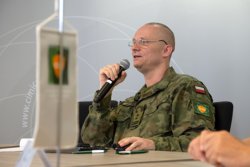 The keynote speeches and presentations of the first day were followed by two days of workshops, each focusing on a current topic within the CIMIC & CMI discipline. Besides information-exchange and the elaboration on current work progress, the primary aim of the workshops was to revise CIMIC & CMI training requirements in detail and to discuss current and potential training solutions. The first workshop focused on civil-military analysis and assessment; followed by a workshop on training gaps and solutions for the political/military level. On day 3, a workshop on collective training kicked off the day. A workshop on Resilience through Civil Preparedness closed the final day of the conference. The results of all workshops, as well as key takeaways from the first day, will be documented in the CIMIC & CMI Discipline Alignment Plan 2020, published on Transnet next month.
The keynote speeches and presentations of the first day were followed by two days of workshops, each focusing on a current topic within the CIMIC & CMI discipline. Besides information-exchange and the elaboration on current work progress, the primary aim of the workshops was to revise CIMIC & CMI training requirements in detail and to discuss current and potential training solutions. The first workshop focused on civil-military analysis and assessment; followed by a workshop on training gaps and solutions for the political/military level. On day 3, a workshop on collective training kicked off the day. A workshop on Resilience through Civil Preparedness closed the final day of the conference. The results of all workshops, as well as key takeaways from the first day, will be documented in the CIMIC & CMI Discipline Alignment Plan 2020, published on Transnet next month.
¹ The guidance of SHAPE J9 will be reflected in the CIMIC & CMI Discipline Alignment Plan 2020.
NATO CIMIC Awareness Course
Current measures to counter the COVID-19 pandemic have significantly impacted NATO’s Education & Individual Training, including the CIMIC & CMI (Civil-Military Cooperation & Civil-Military Interaction) training landscape. As a result, the CCOE is working on new advanced distributed training solutions to ensure continuity in training despite this situation. The NATO CIMIC Awareness Course is a further step towards modern and flexible online training solutions.
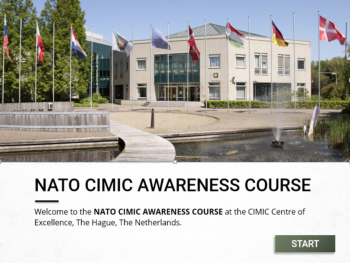 On 1st of June 2020, the CCOE has launched its new NATO CIMIC Awareness Course. The Advanced Distributed Learning course consists of three modules, introducing NATO’s Joint Function Civil-Military Cooperation in about 90 minutes. It is available on our e-learning area, open to everyone and free of charge.
On 1st of June 2020, the CCOE has launched its new NATO CIMIC Awareness Course. The Advanced Distributed Learning course consists of three modules, introducing NATO’s Joint Function Civil-Military Cooperation in about 90 minutes. It is available on our e-learning area, open to everyone and free of charge.
Based on the Allied Joint Publication (AJP) 3.19, CCOE’s CIMIC Handbook and latest publications about NATO’s Cross-Cutting Topics, the NATO CIMIC Awareness Course provides CIMIC newcomers with basic knowledge and understanding of the Joint Function. It serves as a common entry point for all students planning to attend a CIMIC course at the CCOE, its Sponsoring Nations or at the NATO School Oberammergau. It further offers students with a vested interest in Civil-Military Cooperation, a platform to learn more about NATO CIMIC.
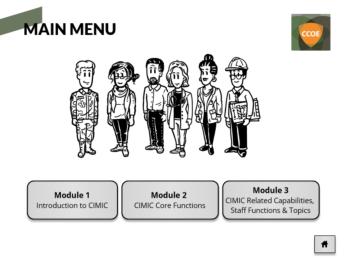 Three modules are guiding the student through the background, nature and focus of CIMIC. They explain the Joint Function’s role as the facilitator of CMI and within a Comprehensive Approach. They outline all three CIMIC core functions and introduce CIMIC related capabilities, staff functions and Cross-Cutting Topics.
Three modules are guiding the student through the background, nature and focus of CIMIC. They explain the Joint Function’s role as the facilitator of CMI and within a Comprehensive Approach. They outline all three CIMIC core functions and introduce CIMIC related capabilities, staff functions and Cross-Cutting Topics.
The course’s reference to the AJP 3.19 familiarizes students with the important CIMIC & CMI doctrine. At the same time, abstracts from the CCOE Handbook provide practical examples of how to conduct CIMIC & CMI activities. References to NATO and United Nations publications on Cross-Cutting Topics provide interested students with additional information and reading material.
The online NATO CIMIC Awareness Course is not only an opportunity for newcomers to the CIMIC community to learn about the Joint Function Civil-Military Cooperation. It is also, CCOE’s first initiative to meet the current and increased demand for online courses as a result of the COVID-19 pandemic.
“The cancellation of NATO courses has occurred at a critical time of year when many Education and Training Facilities (ETFs) are preparing personnel for the summer NATO rotation” (Interim Guidance to Education and Training Facilities Regarding Advanced Distributed Learning, paragraph 1, ACT, 04 May 2020).
Cultural Property Protection Makes Sense
A Way To Improve Your Mission 
The CCOE has updated the Cultural Property Protection Booklet, we couldn’t have done this without many of our partners, CPP units in NLD, UK, US and France, experts from universities and international organisations.
In the last years, we have witnessed conflicts raging near and in cultural sites, like Timbuktu, Mali or Palmyra, Syria and many more. This booklet will give military and civilian alike a great baseline in what we can do to protect these sites and with whom we can do that. This protection is extremely important because this shared heritage will help heal the wounds of conflict by giving people stability through history.
Master of Arts - Civil-Military Interaction
The Master of Arts - Civil-Military Cooperation (M-CMI) is the unique qualification for leaders and senior executives working in organisations with a civil-military interface. For key positions at the CCOE, is the M-CMI a desirable qualification. Soon other entities will pick up the M-CMI as a selection criterion as well.
We work in close cooperation with the Helmut-Schmidt-University (the University of the Bundeswehr in Hamburg, Germany - HSU/UniBw H). The CCOE is the first point of contact for all applicants from within the CIMIC Community. We answer all general question, and we keep the students and applicants informed and up to date. The HSU/UniBw H is the academic host of the M-CMI and provides lecture rooms, teachers and everything that the students need to succeed in their Master program. The HSU/UniBw H also provides the schedule for the academic modules to the CCOE, and we combine them with our modules and send the information out to the students.
NATO CIMIC - US Civil Affairs Synchronisation
The CCOE is to provide subject matter expertise in the field of NATO Civil-Military Cooperation in order to support the transformational process and operational requests of NATO with first priority. Furthermore, the CCOE will also support Sponsoring Nations / Contributing Partners, NATO-Customers and Customers as directed by the CCOE Coordinating Committee. The scope enables the CCOE to establish and sustain relationships and networks to the benefit of a NATO Comprehensive Approach. Therefore, the CCOE establishes and sustains relationships and networks with civilian and military organisations in order to establish lines of consultation and co-operation. The CCOE is nested in a wide-ranging comprehensive network that helps the CCOE to further develop and improve the NATO CIMIC capability with first priority. Furthermore, it helps to stay on top of the latest internal/external developments/tendencies regarding CIMIC/CMI and to gain access to the necessary (human) resources that are crucial for the execution of the CCOE’s Program of Work.
Background of the project
The Alliance has been strengthening its deterrence and defence posture in light of the changed and evolving security environment.
NATO’s Readiness Action Plan. In order to ensure that the Alliance is ready to respond swiftly and firmly to the new security challenges, NATO launched in 2014 the Readiness Action Plan. It provides a coherent and comprehensive package of necessary measures to respond to the changes in the security environment on NATO’s borders and further afield that are of concern to Allies. NATO’s Readiness Action Plan includes increased military activity in the eastern part of the Alliance, which has been in place since May 2014 (“assurance measures”), and longer-term changes to NATO’s force posture (“adaptation measures”). The adaptation measures will increase NATO’s readiness and responsiveness and allows the Alliance to deal with security challenges, including those from the east and the south. The actual focus on Collective Defence includes the (possible) deployment and operation of US forces on European Territory. This includes measures like Enhanced Forward Presence (EFP) and an increase in Field Exercises/deployments, which means that more US Troops –including US Civil Affairs (CA) - are interacting and cooperating with NATO national governments and forces and by those representatives of sovereign nations.
Status of the project
CCOE realized the necessity to assess the effect of the above-mentioned developments and new reality of the security environment and the impact in the field of Civil-Military Cooperation. The CCOE established a framework for NATO CIMIC & US CA capabilities to explore possibilities of enhancing cooperation and thus interoperability. In 2018, CCOE Concepts Interoperability and Capability (CIC) Branch initiated the NATO CIMIC & US CA synchronisation project, which focuses on NATO CIMIC & US CA familiarisation to identify the similarities within the capabilities and exploit the existing professional crosswalks in order to enhance interoperability, which will lead in the end to greater mission effectiveness, when it comes to practical application on the ground.
CCOE CIC Branch, as the main driver of the project has utilised a threefold approach, in which Conceptual, Training & Educational and Academia lines of efforts have been pursued. Next to the established permanent exchange of subject matter experts for training and education, a milestone event of the project was a CCOE mobile training team executing a pilot NATO CIMIC Familiarisation Course (NCFC) in Grafenwoehr, Germany upon the request of the 457th US CA reservist Battalion in November 2019. The pilot was orchestrated and conducted in a combined manner by CCOE CIC and T&E staff members, with, at an earlier phase, support from LL&A Branch, and it was exclusively designated for CA colleagues in order to get better acquainted with NATO CIMIC basics.
In the Academia line of effort CCOE CIC designated members provided lectures about NATO CIMIC and take part as panellist in CA events, providing a special NATO/European perspective for the mainly US CA stakeholders. On the 7th of April 2020, for the first time, the CCOE was invited to present the CCOE and the NATO CIMIC & US CA synchronisation project in the virtual Civil Affairs Association Roundtable discussion.
Civil Affairs Association (CAA) Roundtable discussion on 7th of April 2020
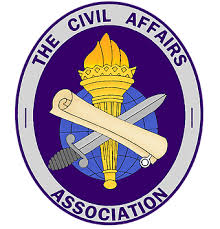
The COVID-19 pandemic forced the CAA to hastily adapt to the situation and transfer its roundtable from the National Guard Armoury in Washington, D.C., to cyberspace. The main virtual event was the “Proponent, Key Stakeholder, and Partner Updates and Discussion of the 2020 CA Force Modernisation Assessment,” moderated by USAJFKSWCS CA Branch Proponent Director of Civil Affairs Force Modernisation. Director CCOE presented the CCOE and its main work strings and delivered his key message that interoperability and in the end mission effectiveness will benefit from an enhanced level of cooperation in the field of Civil-Military Interaction and Cooperation.
Way ahead of the project
The CCOE strives for an efficient and effective enhanced cooperation. Next to the permanent exchange of Subject Matter Experts, mutual and perpetual participation in US CA and NATO CIMIC key events could contribute to promoting the synchronisation project as a whole.
For the year 2021 the NATO CIMIC Key Leader Conference and Community of Interest Workshop (NCKLC & COIWS) are considered the main venues for boosting enhanced cooperation. Next to the Key Leader Engagements (NCKLC), a dedicated stand-alone syndicate is foreseen in the COIWS regarding NATO CIMIC & US CA synchronisation.
Furthermore, the planned execution of three iterations of the enhanced NATO CIMIC Familiarisation Course in the United States in 2021, might also contribute to paving the path for an increased level of cooperation. Next to this, it could result in a standardised NATO accredited NATO CIMIC Familiarisation Course or NATO CIMIC Awareness Course.
In the end, the “way ahead” must lead to enhanced interoperability (the ability to operate in synergy in the execution of assigned tasks).
Lessons Learned and Analyses - Take part in our survey!
 Civil-military information sharing is a complex and sensitive issue and those involved often face challenges on a frequent basis. The NATO Civil-Military Cooperation Centre of Excellence (CCOE) has started a research project on facilitators and impediments to civil-military information sharing. Help us to learn from your experience by completing a short survey.
Civil-military information sharing is a complex and sensitive issue and those involved often face challenges on a frequent basis. The NATO Civil-Military Cooperation Centre of Excellence (CCOE) has started a research project on facilitators and impediments to civil-military information sharing. Help us to learn from your experience by completing a short survey.
If your work involves civil-military information sharing, we would like to hear from you about its challenges, considerations, drawbacks and benefits. The survey will take approximately 10 minutes and is anonymous. Your responses contribute to a better understanding of information sharing within the Civil-Military community and will contribute to enhancing CIMIC Doctrine and Training. Results will be made accessible to everyone on the CCOE website upon completion of the project.
Thank you very much for your time and participation in the survey!
New publication: NATO Building Integrity Handbook
The aim of the handbook is to ensure the audience is aware of corruption risks and their impact on mission success and to raise awareness of corruption and promote BI concepts and tools in order to enhance professionalism and effectiveness across NATO and relevant national structures.
This handbook, developed by NATO Allied Command Operations (ACO) in cooperation with NATO Building Integrity, will help all military and civilian staff at strategic, operational and tactical levels at the NATO Command Structure (NCS) and NATO Force Structure (NFS) as well as NATO HQ, Agencies, and Allied and partner nations to have a better understanding of corruption as a security risk.
SHAPE’s Vice Chief of Staff, Lieutenant General Olivier Rittimann highlights that the ACO Building Integrity Handbook is part of an overall programme of NATO endeavours to raise awareness and create a more comprehensive appreciation, among military and civilian staff across the NATO Command and Force structure, of the risks and impact of corruption on a military mission adding that this handbook is in line with the five core values in the NATO Code of Conduct, and the principles that exemplify them guide us in keeping the professional standards of NATO and our ethical values in line with best practices.
The CCOE CIMIC Messenger is a publication of the CIMIC Centre of Excellence. Its dedicated aim is to provide a forum or platform for stimulating and presenting innovative and comprehensive thinking on NATO CIMIC and Civil-Military Interaction (CMI) related issues such as Mission experiences, concepts, doctrine or lessons learned. The views and opinions expressed or implied in the CCOE CIMIC Messenger are those of the authors and should not be construed as carrying the official sanction of NATO, of any national armed Forces or those of CCOE.
“See you in The Hague!”
